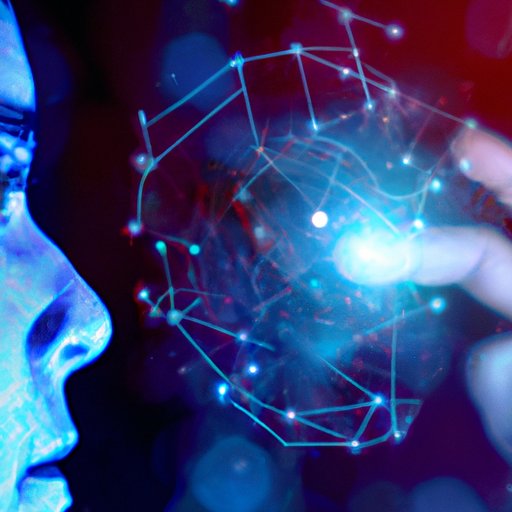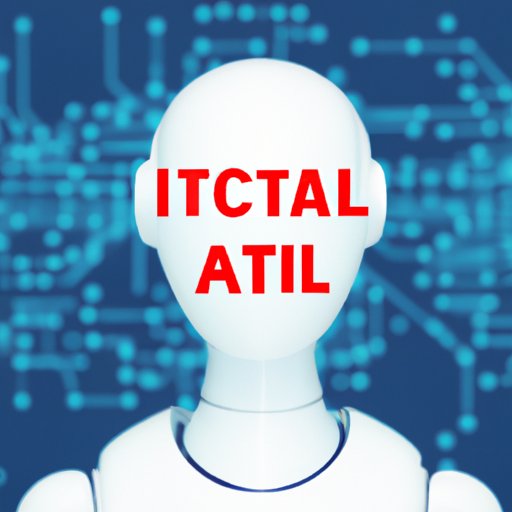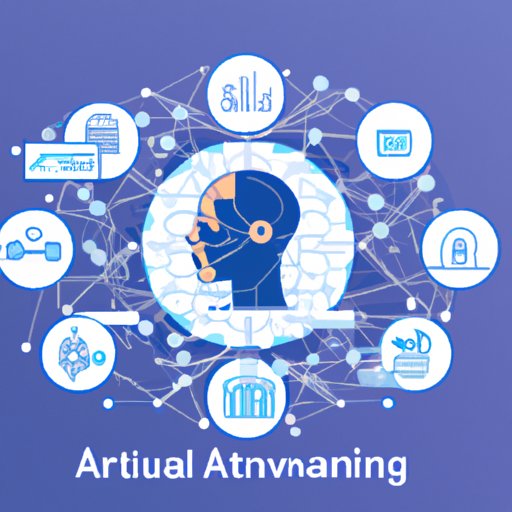Introduction
Artificial intelligence (AI) has become increasingly present in our lives and will continue to be a part of our future. But what exactly is AI? In this article, we’ll explore the definition of AI, the types of AI, its applications and its impact on society. We’ll also look at some of the ethical considerations associated with AI.
A Beginner’s Guide to Artificial Intelligence
At its core, AI is a form of computer technology that enables machines to learn from experience, adjust to new inputs and perform tasks that would otherwise require human intelligence. AI is used to solve complex problems and can be applied to a wide range of activities, from self-driving cars to facial recognition technology.
What is AI?
AI is a branch of computer science focused on creating machines that can think and act like humans. AI systems are designed to learn from their environment, recognize patterns, make decisions and take action. AI systems can also be programmed to mimic human behavior, such as understanding natural language or recognizing faces.
Types of AI
AI can be broken down into three main categories: narrow AI, general AI and super AI. Narrow AI is the most common type of AI and is designed to carry out specific tasks. Examples of narrow AI include virtual personal assistants like Siri and Alexa, self-driving cars and facial recognition technology. General AI is an AI system that is able to apply its intelligence to any task. Super AI is an AI system that is capable of surpassing human intelligence. This type of AI does not yet exist.
AI Technologies
The development of AI is driven by several key technologies, including AI algorithms, machine learning and natural language processing. AI algorithms are used to create rules for AI systems to follow. Machine learning is a type of AI that enables computers to learn without being explicitly programmed. Natural language processing is a type of AI that enables machines to understand and respond to human speech.
An Overview of AI: What is it and How Does It Work?
AI is made up of several different components, including AI algorithms, machine learning and natural language processing. AI algorithms are used to create rules for AI systems to follow. For example, an AI algorithm might be programmed to recognize objects in an image. Machine learning is a type of AI that enables computers to learn without being explicitly programmed. For example, a machine learning system might be trained to recognize cats in photos. Natural language processing is a type of AI that enables machines to understand and respond to human speech.
AI Algorithms
AI algorithms are programs or sets of instructions that enable AI systems to complete tasks. These algorithms are designed to process data and identify patterns in order to make predictions or decisions. Common examples of AI algorithms include deep learning algorithms and neural networks.
Machine Learning
Machine learning is a type of AI that enables computers to learn without being explicitly programmed. Machine learning algorithms use data to find patterns and make predictions. For example, a machine learning system might be trained to recognize cats in photos. The more data the system is exposed to, the better it becomes at making accurate predictions.
Natural Language Processing
Natural language processing (NLP) is a type of AI that enables machines to understand and respond to human speech. NLP algorithms analyze text and spoken language to identify meaning and respond appropriately. For example, a chatbot might use NLP to understand questions and provide answers.

Exploring the Possibilities of Artificial Intelligence
AI has been rapidly advancing over the past few years and is now being used in a variety of ways. Let’s take a look at some of the applications, benefits and limitations of AI.
AI Applications
AI is being used in a variety of industries, from healthcare to finance. AI is being used to improve medical diagnosis, automate financial transactions, optimize supply chains and much more. AI is also being used to develop autonomous vehicles, smart homes and other consumer products.
Benefits of AI
AI can provide significant benefits to businesses and individuals alike. AI can be used to automate mundane tasks, freeing up time for more important work. AI can also help businesses make better decisions by providing insights and analysis. AI can also be used to improve customer service and increase efficiency.
Limitations of AI
Despite its potential, there are several limitations to AI. AI systems are only as good as the data they are given, which means they can be prone to mistakes. AI systems can also be difficult to interpret, as they often rely on complex algorithms. Finally, AI systems can be expensive to implement and maintain.
Common Uses of AI in Everyday Life
AI is becoming increasingly present in our everyday lives. Here are some of the most common uses of AI.
Autonomous Vehicles
Autonomous vehicles, such as driverless cars, are one of the most common uses of AI. Autonomous vehicles use AI algorithms and sensors to detect objects in their environment and navigate accordingly. Autonomous vehicles have the potential to drastically reduce traffic accidents and increase efficiency.
Smart Homes
Smart homes are another common use of AI. Smart home devices, such as thermostats, lights and security systems, use AI to learn user preferences and automate tasks. For example, a smart thermostat might be able to adjust the temperature based on the time of day or the number of people in the house.
Healthcare
AI is also being used in healthcare to improve diagnosis and treatment. AI algorithms are being used to diagnose diseases more accurately, identify potential drug interactions and even detect cancer. AI is also being used to track patient health and provide personalized care.

Impact of AI on Society
AI has the potential to have a major impact on society. Here are some of the ways AI is impacting society.
Job Automation
One of the biggest impacts of AI is job automation. AI systems are increasingly being used to automate manual labor, which could lead to job losses in certain industries. According to a report by McKinsey Global Institute, “45 percent of the activities individuals are paid to do in the world’s workforce could potentially be automated by adapting currently demonstrated technologies.”
Privacy Issues
Another impact of AI is privacy issues. AI systems collect and store large amounts of data, which can be used to track individuals or target them with ads. AI systems can also be used to manipulate public opinion or spread misinformation. As AI becomes increasingly prevalent, it’s important to consider the potential implications on privacy.
Social Impact
AI has the potential to both benefit and harm society. On one hand, AI can be used to improve healthcare, reduce poverty and promote education. On the other hand, AI can be used to automate jobs, manipulate public opinion and invade privacy. It’s important to consider the potential implications of AI before implementing it.
Ethical Considerations of AI
As AI continues to evolve, it’s important to consider the ethical implications of using AI. Here are some of the ethical considerations associated with AI.
Safety
Safety is a major concern when it comes to AI. AI systems must be designed and tested carefully to ensure they are safe to use. AI systems must also be monitored constantly to identify and address any potential safety issues.
Fairness
AI systems must also be designed to be fair and unbiased. AI systems should not discriminate against certain individuals or groups of people. AI systems should also be transparent so users can understand how they work and why they make certain decisions.
Transparency
Finally, AI systems must be transparent. AI systems should be designed in such a way that users can understand how they work and why they make certain decisions. This will help ensure that AI systems are being used ethically.
Conclusion
AI is a rapidly evolving technology that has the potential to revolutionize the way we live and work. From autonomous vehicles to healthcare, AI is being used in a variety of ways. However, it’s important to consider the implications of using AI, from job automation to privacy issues. Finally, it’s important to ensure that AI systems are designed and tested carefully to ensure they are safe and fair.
Summary of Key Points
In this article, we explored what artificial intelligence (AI) is and how it works. We looked at the types of AI, its applications and its impact on society. We also discussed the ethical considerations associated with AI, such as safety, fairness and transparency. Finally, we looked at some of the common uses of AI in everyday life.
Final Thoughts
AI is an incredibly powerful technology with the potential to revolutionize the way we live and work. However, it’s important to consider the implications of using AI and ensure that AI systems are designed and tested carefully to ensure they are safe and fair.
(Note: Is this article not meeting your expectations? Do you have knowledge or insights to share? Unlock new opportunities and expand your reach by joining our authors team. Click Registration to join us and share your expertise with our readers.)
